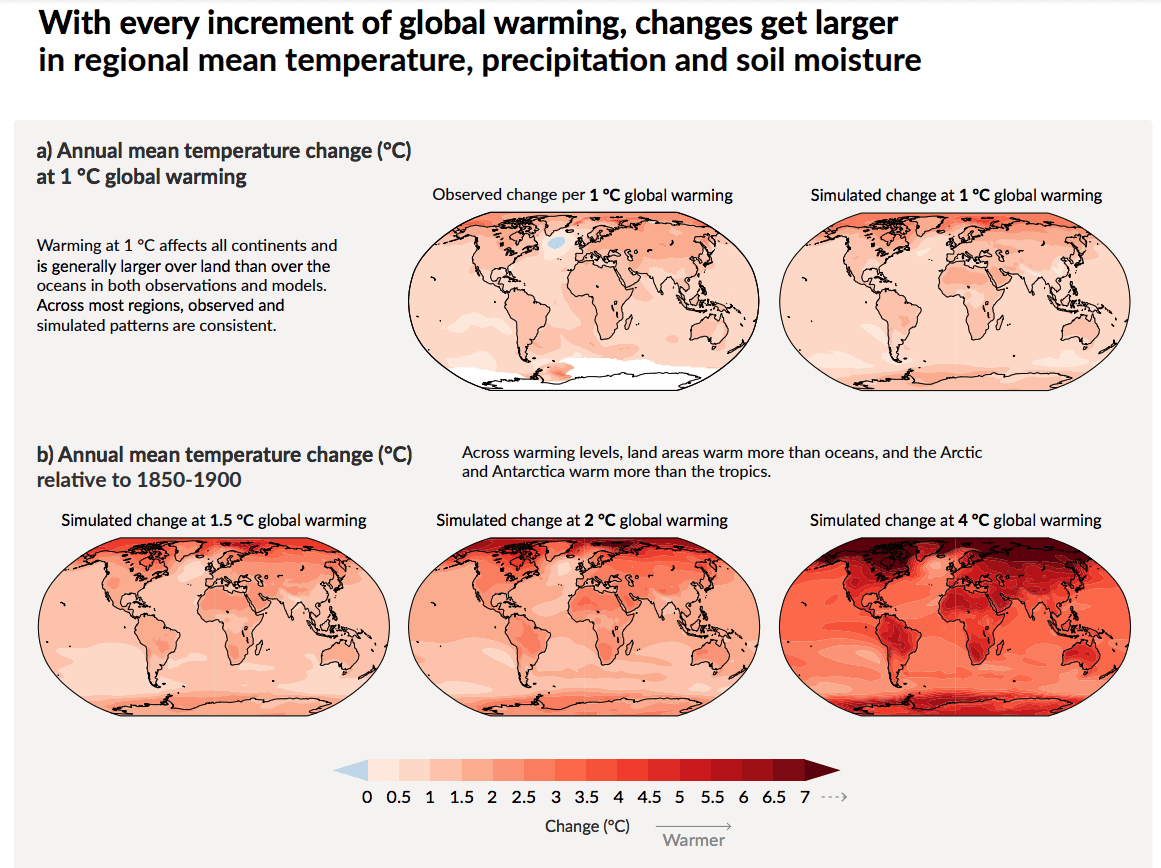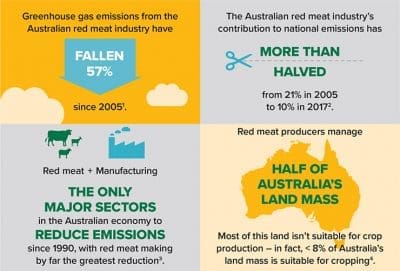
Graphic from IPCC report demonstrating changes in annual mean surface temperature, precipitation, and soil moisture. Source: IPCC Sixth Assessment Report
CLIMATE scientists have upped the ante in the push for global action to drastically cut greenhouse gas emissions, warning in a major new report released overnight that there is now “high certainty” that to stabilise the climate, CO₂ emissions must reach net zero, and other gas emissions must decline significantly.
The IPCC’s sixth ‘state of climate change’ update, authored by 234 climate scientists from 66 countries, is the first major report of its kind since 2013, and comes ahead of the UN global climate change summit (COP26) to be held in Scotland in late October/early November.
The report says global temperatures have risen faster than expected, climbing by 1.09C since the industrial revolution. Of that increase, it says 1.07C can be attributed directly to human activity, and just 0.02C to natural variabillity.
Climate change is now affecting “every continent, region and ocean on Earth, and every facet of the weather”; many changes such as sea-level rise and glacier melt are now “virtually irreversible”, and it is now “unequivocal’’ that human activity is heating the planet.
Outlining the case for drastic cuts to emissions, the report states that about 85 percent of CO₂ emissions are from burning fossil fuels, with the remaining 15 percent generated from land use change, such as deforestation and degradation.
Methane and nitrous oxide, the second and third biggest contributors to global warming after CO₂, have also increased more quickly, the report states.
Methane emissions from human activities largely come from livestock and the fossil fuel industry.
Nitrous oxide emissions largely come from the use of nitrogen fertiliser on crops.
“This report must sound a death knell for coal and fossil fuels, before they destroy our planet,” UN Secretary General Antonio Guterres said following the report’s release.
“If we combine forces now, we can avert climate catastrophe.”
It has been well established that emissions from different gases have different impacts on global temperatures.
Scientists such as Oxford University’s Dr Myles Allen have previously publicly pointed out that the widely-used GWP-100 metric (which underpins emissions accounting used in the IPCC report), which expresses methane emissions as CO2 equivalents, mischaracterises the impact of methane emissions from livestock on global temperatures compared to fossil fuel-based carbon dioxide emissions, which risks leading to misguided policies that inaccurately target animal agriculture.
Deep within its 3900 pages the IPCC report includes a discussion on the differences in climate accounting metrics, which notes that that “expressing methane emissions as CO2 equivalent emissions using GWP-100 overstates the effect of constant methane emissions on global surface temperature by a factor of 3-4 over a 20-year time horizon … while understating the effect of any new methane emission source by a factor of 4-5 “.
Dense discussion in Chapter 7 of new IPCC report on short vs long lived climate pollutant metrics. Very relevant for ruminant agriculture & what “net zero” would really mean for those & other industries with biogenic CH4 dominating their GHG profiles https://t.co/AMFBX4HZ5U pic.twitter.com/8w4WLnW0i0
— Sara Place (@drsplace) August 9, 2021
The significance of the difference between which accounting metric is used was neatly summed up in the following quote by Dr Allen in an article published in May:
“If we all turn vegetarian, but we don’t do anything about fossil fuel emissions, in five years we’ll be in exactly the same position we were before. But we’re vegetarians.”
A metric called GWP* (global warming potential – star) proposed by Dr Allen and his team focuses on the warming effects of the different gases, rather than their rate of emissions.
Stable herds and flocks do not contribute to additional global temperature rises, which is demonstrated under the GWP* metric.
As the Australian livestock sector moves to rebuild from historically low herd and flock levels in coming years, the industry is facing an increasing imperative to adopt to technologies and practices that will limit emissions.
Strategies include the use of tropical legumes which contain sap and tannins and emerging feed additives that contribute to reduced livestock methane emissions, and genetic technologies to select for more efficient animals.
“Unless those technologies are adopted at a pace that is on a par or greater than the growth in the herd and flock population we are going to increase methane emissions, and we’re going to have to justify that in a global market that is looking for industries to not do that,” was how one livestock industry source summed up the challenge facing red meat producers as global pressure to manage and reduce emissions continues to ramp up.
Industry reaction
In response to the IPCC report the Cattle Council of Australia said the Australian beef industry and broader red meat sector had the nation’s most ambitious target to reach net-zero emissions, and a plan to achieve it, under the CN30 initiative.

Source: MLA CN30
“Australian producers are impacted by the effects of climate change first-hand and take this report seriously,” Cattle Council CEO Travis Tobin said
“Our producers should be extremely proud of their work to cut greenhouse gasses.
“Every year we invest millions into the science that will get us there.
“Through genetics, pasture species, feed additives, and management practices, we’re making our production systems more efficient, which has already cut our emissions by more than half since 2005.
“Our success to date has come from our producers choosing to do what they believe is right.
“Beef producers manage 79 pc of Australia’s agricultural land, which puts the industry in the position to be part of the solution to Australia’s broader climate targets.
“We have the capacity, not only to get to net-zero, but to offset the emissions of other industries.”
Similarly the Global Roundtable for Sustainable Beef last month laid out a commitment for the sector to reduce the net global warming impact of beef by 30 percent by 2030, as outlined in its recently launched global sustainability goals.
The National Farmers Federation noted that Australian farmers are the amongst the world’s most progressive in their approach to mitigating climate change.
“The findings of the Intergovernmental Panel on Climate Change’s Sixth Assessment Report of climate science details a concerning trend which warrants a plan for our nation, including for agriculture,” NFF Chief Executive Tony Mahar said.
“However, the alarming headlines of the report must be read in the context of what agriculture has already achieved.
“Farmers made a significant contribution to over-achieving Kyoto targets, and we didn’t get any compensation for doing so. For the current task farmers will play a role but we need to see other parts of the economy stepping up as well, we can’t and won’t bear the brunt of reform again.”
Analysis by CSIRO showed it was possible to achieve net zero greenhouse gas emissions by 2030 by increasing soil carbon and reducing emissions without the need to reduce herd and flock numbers.
“There are several millions of dollars being spent on getting better data on soil carbon, and how to manage it for multiple outcomes including carbon, biodiversity and water retention, which will underpin productivity gains,” Mr Mahar said.
“We just need to know more about how the cycle works with management options and how we monitor it more efficiently.
“Investment is also happening in developing alternate pathways to market, and the voluntary carbon market is beginning to attract corporate attention in Australia.”
Mr Mahar said new sciences would also play a key role, such as specialised feed additives that have the potential to maintain or increase productivity while reducing methane emissions by up to 60 per cent.
Mr Mahar said the NFF supported an economy-wide net carbon neutral 2050 target with two important caveats: an economic pathway is determined and farmers are not burdened by unnecessary red tape.
“Farmers are on the frontline of climate change. They are also the lifeblood of our rural communities and a powerhouse of the national economy.
“Agriculture is committed to continuing to be part of Australia’s climate change solution. It’s essential farmers are assured of the economic sense of any national policy solutions and that, as with all industries, the sector is given adequate time to transition,” Mr Mahar said.
